As delegates gathered for champagne at a US stock market hub on the Davos Promenade to watch Donald Trump's inauguration, there was a frisson of excitement.
One executive mused that Trump would boost the stock market: "His programme is more definitive than 2016."
But when Trump began his speech, there were occasional gasps. His promise to expel "millions" of undocumented migrants prompted one delegate to whisper: "He obviously doesn’t have a gardener."
Trump's return dominated the 55th session of the World Economic Forum (WEF). Every panel discussion and keynote address was gripped by whether he would unleash the US economy or bring the globe to its knees.
Ironically, some of the Davos regulars were absent as they were - like TikTok’s chief executive Shou Zi Chew - sitting in Washington a few rows away from Trump as he made his speech.
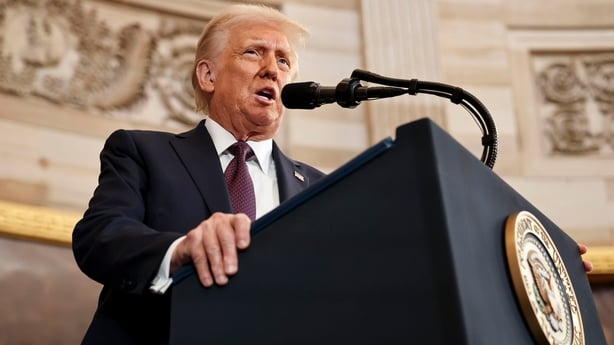
The WEF organisers do their best to blend top-tier capitalism with enlightened sessions on poverty, refugees, gender parity and tackling climate change (2024 was the hottest year on record).
There's never an opportunity missed to focus on the positive, the WEF blurb hailing AI, quantum, energy tech, biotech and health tech as all potentially increasing "productivity and hence standards of living".
There was the ceasefire in Gaza, a new start in Syria and signs that the global economy was recovering (PwC’s survey of 4,000 global CEOs found that three in five were optimistic about economic growth).
In geo-politics, could the sheer kinetics of Trump’s return unblock some long standing geo-political problems?
"Trump 2.0 actually facilitated the [Gaza] ceasefire," observed Mina al-Oraibi, editor of the United Arab Emirates newspaper The National.
"This is the same deal that 13 months ago, the Americans had said that they could pull off under a Joe Biden administration, but ultimately it was the Trump factor."
As the week went on, exuberance from the US corporate sector deepened.
"Trump gives America a really good chance to revive its animal spirit," Richard Edelman, president of the eponymous global PR firm, told CNBC.
"There will be less regulation, there will be more energy supply, there will be more of a sense of markets functioning and [less] regulation, and I think Trump is a shot in the arm for business."
By contrast, WTO Director-General Ngozi Okonjo-Iweala warned: "If we have tit-for-tat retaliation, whether it's a 25% tariff [or] 60% and we go to where we were in the 1930s we're going to see double-digit global GDP losses. That's catastrophic. Everyone will pay."
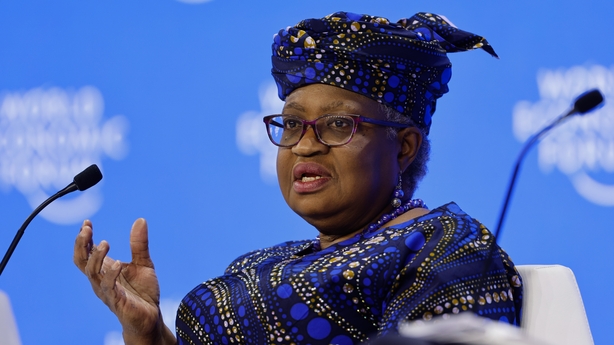
Then came Thursday.
In a head-spinning address, Trump depicted an ultra-deregulated US economy turbo-charged by crypto, AI and the accelerated extraction and increased consumption of fossil fuels.
Global businesses would be lured to the US by a 15% corporate tax rate - or face tariffs. Interest rates would be down, employment up, inflation would sink.
A new 'Golden Age for America', and a utopian light creeping across the Earth.
"Our country will soon be stronger, wealthier and more united than ever before, and the entire planet will be more peaceful and prosperous as a result of this incredible momentum," Trump told a packed Congress Hall.
At a stroke, Trump has demolished the prevailing orthodoxy: targeted state intervention to tackle the economic fallout from the pandemic and to transition the West to a digitalised, carbon-neutral economy.
Joe Biden mastered it with the Inflation Reduction Act (IRA). The EU joined in with the Covid Recovery and Resilience Fund (RRF) and the European Green Deal. The Mario Draghi report had a further prescription: borrow tens of billions to meet climate goals, boost competitiveness and increase defence spending.
Trump is slashing that model: in its place, ultra-liberalism, the retreat of the state, economic nationalism - and to hell with the climate.
Europe, in other words, is being told the rules have changed just as it’s starting to fight the last battle, one that was already looking barely winnable.
In Davos, European decline felt like an even deeper problem, next to the dazzle of Trumponomics.
"There is too much pessimism in Europe," Larry Fink, CEO of Blackrock told a panel yesterday. "I’ve never felt it larger and more profound."
At a panel on Tuesday, the Financial Times editor Roula Khalaf quoted the Draghi report.
"On a per capita basis, real disposable income has grown almost twice as much in the US as in the EU since the year 2002; only four of the world's top 50 tech companies are European; if the EU were to maintain its average productivity growth rate since 2015 it would only be enough to keep GDP constant until 2050.
"There is no EU company with a market [capitalisation] over €100bn that has been set up from scratch in the last 50 years, while all six US companies with an evaluation above €1 trillion have been created in this period."
Draghi’s successor, ECB president Christine Lagarde, agreed. This was (another) wake-up moment for Europe, but there were positives.
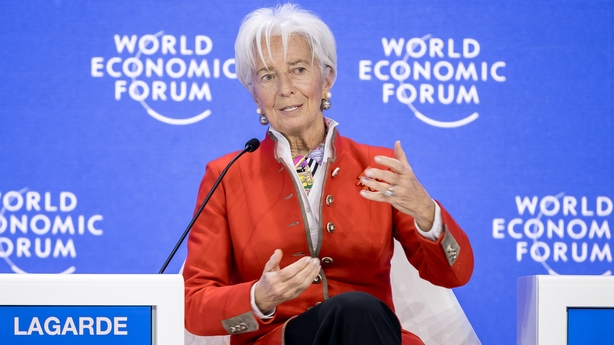
"We have the talent, we have the money, we have the ideas. In areas where it matters for the future, we file as many patents as the United States. We have a lot of assets but we shoot ourselves in the foot many times because we don’t complete the work we set out to do [ie, completing the Single Market]."
European Commission president Ursula Von der Leyen warned of the EU's ability to compete in "a harsh new era" and to preserve Europe’s strengths.
"Europe has a unique social market economy," she said. "We have the second largest economy and the biggest trading sector in the world. We have longer life expectancy, higher social and environmental standards and lower inequalities than all our global competitors."
She promised to engage pragmatically with Trump, to stick to the Paris Climate Accord, and flirted with India and China (all 27 EU Commissioners will travel to India for two days at the end of February to boost trade).
Yet, the EU’s revival of trade deals is on shaky ground. The prize of Mercosur, the biggest global free trade deal in history, still faces staunch opposition from some member states, including Ireland.
Secondly, the argument that the deal is better, as it legally binds both sides to the Paris Accord, has already been upended: Argentina’s Trumpist leader Javier Milei, a signatory to Mercosur, has hinted he is about to abandon Paris.
Not everyone in Davos celebrated Trump's Godzilla economics.
Jose Vinals, president of Standard Chartered bank, warned his threat of tariffs could cause market volatility and boost US inflation.
"We need to be ready for that," he said. "The market is trying to understand what may be the actual reach of the tariffs that the United States imposes on other countries."
Fernando Honorato Barbosa, Chief Economist of Banco Bradesco, told a panel on Wednesday: "We are talking about a world with higher import tariffs, we are talking about a world with high fragmentation, a world of low efficiency. [If we have] less globalisation, more trade barriers, this means that companies will face higher costs and consumers will face higher prices."
Elsewhere, there was no shortage of flattery.
UN Secretary General António Guterres praised Trump’s "robust diplomacy" in unblocking the Gaza hostages-ceasefire negotiations.
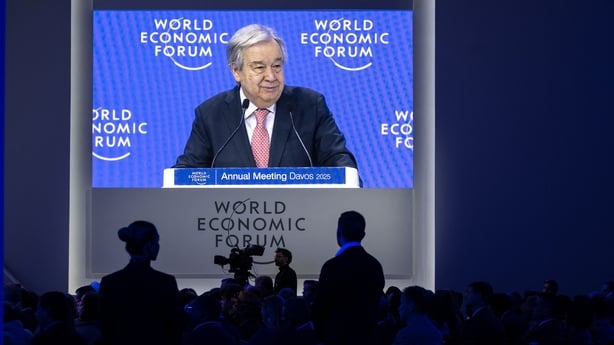
While he railed against financial institutions and industries rowing back on their climate commitments as being "on the wrong side of history...the wrong side of science", he ignored Trump's rejection of Paris (the EU climate commissioner Wopke Hoekstra described it as "truly unfortunate").
If flattery didn't work, how about some Trumpian transactionalism?
Ireland's EU Commissioner Michael McGrath confirmed to RTÉ News that Brussels was already planning to collectively buy more American Liquified Natural Gas (LNG), as per Trump's demand.
"It is a credible option," he said. "The EU has been preparing for the incoming administration for quite some time and stands ready to put forward a package which would help to improve and indeed strengthen the Transatlantic economic and trading relationship."
It remains to be seen how it would work.
European imports of Russian LNG have been increasing, so a switch to US gas would make political sense.
However, the United States is producing at capacity and domestic consumption is rising due, in part, to the high energy needs of AI.
That means there may be limited spare capacity to export; furthermore, it is private companies - and not governments - who import oil and gas, and they are guided by price rather than politics.
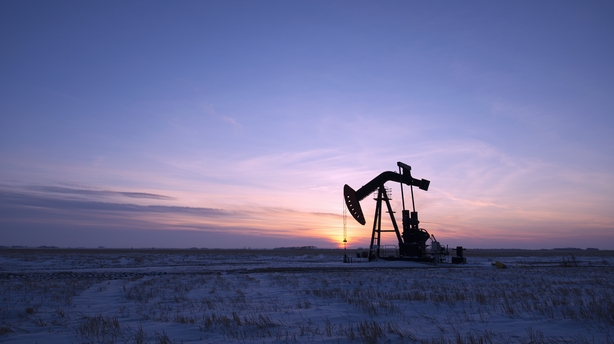
There are other risks - not least for Ireland.
Trump is wielding tariffs for blackmail rather than protectionist reasons, hitting countries to prevent them taxing US firms operating on their territories, or, as he threatened on Thursday, bribing businesses to shift to the US.
Scott Bessent, his incoming Treasury Secretary, put it more politely in an article last year: "Interventions at the macroeconomic level, like broad-based tariffs, will be more effective than microeconomic interventions like industrial policy that generally rely on the government to pick winners and losers."
The US's cheap and abundant energy could further persuade corporations to switch to there (a senior Intel executive told RTÉ News this week that the cost per kilowatt hour of operating its Kildare facility was double that of Israel or the US, even though the plant would be "critical" to its European operations for at least seven years).
Trump's plans might still go awry, not least if inflation takes off.
He has trashed the multi-billion dollar subsidies of Joe Biden's Inflation Reduction Act, meaning its beneficiaries - including some European companies - could shift back to the EU.
The Financial Times has reported that Wall Street is unlikely to pour billions into revived drilling and shale schemes if the price of oil looks set to fall.
Friedrich Merz, expected to be the next German Chancellor, remarked in Davos that when Trump last slapped tariffs on European steel and aluminium, the EU hit back with increased duties on Levi jeans, Jack Daniels and Harley Davidsons.
"Within six months, the problem was solved," he told delegates on Tuesday. "The only way… is to be strong on the European side and to negotiate with the American side from a position of strength, finding out where we have politics in common and… where we have our own interests."
The EU's climate and competition commissioner Teresa Ribera took a swipe at Trump’s brand of economic populism and "parties who claim to be defending the [working] classes when they speak out against climate action".
"The climate will affect [the] quality of life, health and prospects for anyone in any country, but also economic security. We have seen it in the fires in Los Angeles, in the flooding in many parts of the world including Spain."
Senior figures at Davos agreed on one thing: the wake-up call that Europe needed has now become existential, thanks to Donald Trump's return.
Expect to hear an intensified debate about Europe boosting its competitiveness, cutting red tape, developing a capital markets union (as IMF boss Kristalina Georgieva remarked, the US's vastly superior productivity is thanks to its cheap energy and deep, liquid capital markets).
During Trump's first term, Europeans tended not to take him literally, or seriously. That will not be an option this time around.







